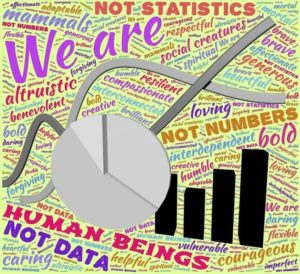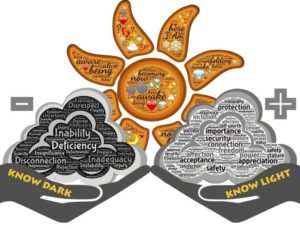“Perfection is not attainable, but if we chase perfection we can catch excellence” –Vince Lombardi
The textbook definition of perfection is the condition, state, or quality of being free or as free as possible from all flaws or defects. Perfection is also defined as the action or process of improving something until it is faultless or as faultless as possible.
Perfectionism requires continuous work toward improving until as faultless as possible. The problem is that no human is without faults, therefore continuing to work towards being faultless is an unreachable task. Self- reflection, self-awareness, and making amends are all fault correcting actions, but no human is without continuous faults.
Perfectionists fear rejection and failure and see mistakes and faults as a negative reflection of their own self-worth, not realizing perfectionism is an unattainable illusion. Excellence can be achieved without being perfect.
Embracing and accepting imperfection is one way to begin putting the joy back in life that perfectionism takes away. Accepting imperfection can create an inner freedom and happiness that fosters a more affirmative relationship with one’s self and others. Life can be beautiful, mistakes can just be mistakes, and excellence can be achievable without having to master a type of perfection that does not exist.
It’s a beautiful life is taking a look at “How to Embrace Being Imperfect”.
Imperfection is beauty, madness is genius, and it’s better to be absolutely ridiculous than absolutely boring – Marilyn Monroe
Embrace the idea that imperfection is real, perfection is not.
 Research shows that self-esteem is positively correlated with happiness in life –but perfectionism fosters low self- esteem, regret, and dissatisfaction. Perfectionism can destroy happiness in various areas of life. Embracing the idea that continuous growth is a natural part of life opens the mind to the acceptance of imperfection.
Research shows that self-esteem is positively correlated with happiness in life –but perfectionism fosters low self- esteem, regret, and dissatisfaction. Perfectionism can destroy happiness in various areas of life. Embracing the idea that continuous growth is a natural part of life opens the mind to the acceptance of imperfection.
In The New Times best seller, “The Gift of Imperfection: Let go of Who You Think You’re Supposed to be and Embrace Who You Are” author Renee Brown, Ph.D. writes,
“Now more than ever, we all need to cultivate feelings of self- worth, as well as acceptance and love for ourselves. In a world where insults, criticisms, and fears are spread too generously alongside messages of unrealistic beauty, attainment and expectation, we look for ways to “dig deep” and find truth and gratitude in our lives. A new way forward means we can’t hold on too tightly to our own self-defeating thoughts or the displaced pain in our world. Instead, we can embrace the imperfection.”
Embrace Imperfection in the World
 Research shows that self-esteem is positively correlated with happiness in life –
Research shows that self-esteem is positively correlated with happiness in life –
But perfectionists base self-worth on level of achievements. Perfectionists feel worthless when not being successful or achieving, which leads to self-criticism.
In today’s world, movement is toward achievement and great emphasis is placed on goal orientation. Perfectionists do achieve goals, but can often assume that the goal was too easy, as perfectionist’s standards are often unrealistic.
Life is not perfect. The world produces beauty, but the world also produces pain. Natural disasters and other uncontrollable situations in the world are plentiful. People in the world are imperfect. Greed and selfishness exist. Prejudice, judgment, and contempt have negative effects on the world as a whole.
We as individuals are imperfect. Addiction, repeating unhealthy habits, misguided anger, and overall unhealthy tendencies often motivate our behavior, no matter how much we intend to “do the right thing”.
Embracing Imperfection in the world may aid in facing and letting go of personal perfection.
Embrace a Growth Mindset
 Embracing a growth mindset is the first step in the process of learning how to embrace imperfection. Embracing the realities of the effects of perfectionism shines light on how trying to attain perfectionism affects life. Having an attitude that embraces growth is critical for inner change. Embracing a growth mindset will eventually lead to continued self-acceptance.
Embracing a growth mindset is the first step in the process of learning how to embrace imperfection. Embracing the realities of the effects of perfectionism shines light on how trying to attain perfectionism affects life. Having an attitude that embraces growth is critical for inner change. Embracing a growth mindset will eventually lead to continued self-acceptance.
According to Psychology Today’s article on “15 Ways to Build a Growth Mindset”, “If we have a “growth mindset,” we enjoy challenges, despite the risk, usually because we value learning and growth more than others thinking we know what we’re doing. And because we’re always trying new things, we often don’t know what we’re doing. Still, those of us with a growth mindset often build new skills more easily because we believe we can and so we really work at it.”
Embracing a growth mindset leads to embracing imperfections.
Embrace the journey
 Abigail Brenner M.D. took a look at what embracing the journey represents. Her article “Journeys: Exploring Your World Inside and Out”, reflected that “Journeys help us connect with the universal sense of what it means to be human. When we journey among others beyond the familiar, we have the opportunity to see what is common among all people: how we love, how we work, how we relate in family and community, what our basic needs are, and how we meet them. Journeys connect us with the pathos of the human experience, and through this teach us compassion for others. They broaden our understanding, heighten our experience, and challenge us to express our true nature more fully.”
Abigail Brenner M.D. took a look at what embracing the journey represents. Her article “Journeys: Exploring Your World Inside and Out”, reflected that “Journeys help us connect with the universal sense of what it means to be human. When we journey among others beyond the familiar, we have the opportunity to see what is common among all people: how we love, how we work, how we relate in family and community, what our basic needs are, and how we meet them. Journeys connect us with the pathos of the human experience, and through this teach us compassion for others. They broaden our understanding, heighten our experience, and challenge us to express our true nature more fully.”
Being relatable and having compassion for the imperfections of others creates a journey filled with self-reflection, awareness, and opening up the ability to embrace imperfection.
Embrace Self-Acceptance
-You’ve got to be able to love yourself as you are before you can find genuine satisfaction with your place in the world.-
 “The Path to Unconditional Self- Acceptance” states “When we’re self-accepting, we’re able to embrace all facets of ourselves—not just the positive, more “esteem-able” parts. As such, self-acceptance is unconditional, free of any qualification. We can recognize our weaknesses or limitations, but this awareness in no way interferes with our ability to fully accept ourselves.
“The Path to Unconditional Self- Acceptance” states “When we’re self-accepting, we’re able to embrace all facets of ourselves—not just the positive, more “esteem-able” parts. As such, self-acceptance is unconditional, free of any qualification. We can recognize our weaknesses or limitations, but this awareness in no way interferes with our ability to fully accept ourselves.
Without learning how to embrace imperfection, self-acceptance cannot exist.
In the Psychology Today article “The Secret to Mastering Acceptance” “acceptance often requires ongoing work and conscious effort,” the article goes on to state that “We need to remind ourselves that it’s okay not to accept something right away, putting too much pressure on ourselves to come to terms with something immediately can backfire, since it may intellectualize and invalidate our feelings, which in turn, makes it harder to accept the situation.”
Embracing self-acceptance goes hand in hand with learning to embrace imperfection.


